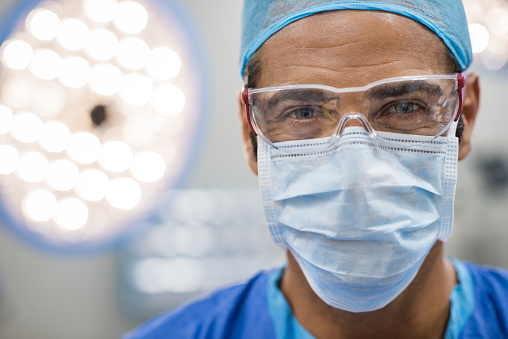Sussex Premier Health, Hastings: Important update for patients with upcoming appointments
Sussex Premier Health, Hastings: Important update for patients with upcoming appointments
Treatment to reduce an enlarged prostate that is causing problems

During surgery, your surgeon will remove part of your prostate – a small gland that sits at the base of the bladder in men. The gland surrounds your urethra – the tube that carries urine from your bladder to your penis.
An enlarged prostate, also known as benign prostatic hyperplasia (BPH), is a common condition in older men and the causes are thought to relate to age and changes in hormone level, with older age and family history increasing the risk.
Your doctor may recommend treatment or refer you to a urology specialist if you have moderate to severe urinary problems which haven’t improved with:
The treatment will trim away or destroy the obstructive prostate tissue that’s pressing on your bladder and urethra, easing symptoms.
At Sussex Premier Health, you’ll meet your consultant in one of our private consultation rooms. During this time you will be able to explain your medical history symptoms and raise any concerns that you might have.
We will also discuss with you whether any further diagnostic tests such as scans or blood tests are needed. Any additional costs will be discussed before further tests are carried out.
Your consultant will diagnose a prostate enlargement by asking about your symptoms and carrying out tests, which may include:
Your consultant will then be able to outline a treatment and care plan that’s tailored to you.
You may also need a pre-operative assessment with a specialist nurse before going ahead with treatment. During this pre-operative assessment, you might undergo some blood or other tests to help check your fitness for surgery, you’ll also have to inform us of any medication you are currently taking.

On the day of your operation, our ward staff will show you to your own private room. Your private room will have an en-suite bathroom and TV and Wi-Fi facilities. You’ll usually stay with us for one to two nights.
Once you’re ready, our nurses will help you prepare for your operation. There’ll be a chance to see your consultant surgeon and meet your anaesthetist. Your anaesthetist will advise on what anaesthetic is best for you, based on your health and personal preferences. It will either be:
You may need a urinary catheter after the operation. This is because your urethra may be swollen which can block urine from passing. This will be taken out by one of our nurses before you leave hospital.
The procedure lasts for 45 to 90 minutes.
There are different methods available for prostate surgery, which your consultant will have discussed with you at your initial consultation.

As expected after surgery, you’ll feel some pain afterwards. Our nurses will help you manage this by giving you painkillers and advice about what over-the-counter medicines you can take after you leave hospital.
We aim to get you back to everyday life as quickly as possible, although everyone’s different and your treatment and recovery will be personal to you. If you have a catheter, you can expect to return home once it has been removed, this is usually within two to three days.
You can expect to resume driving and gentle activities such as walking after one to three weeks of recovery, though you should always stop if you start to feel any pain. You may also be able to go back to work if you have a desk-based job and you should be able to have sex if you’re comfortable enough.
A full recovery can take anywhere between four to eight weeks.
If you have an enlarged prostate, it can press on your bladder and urethra, interrupting urine flow and causing these symptoms:
Other complications due to blocked urine flow may include:
Your surgery will be performed by your consultant surgeon.
TURP
The standard method is transurethral resection of the prostate (TURP). During a TURP procedure, which is usually performed under general anaesthetic
TURP may also be performed to treat or prevent any further complications as a result of blocked urine flow, including recurring UTIs, kidney and bladder damage, bladder stones, blood in the urine and difficulties in urination.
UroLift
UroLift is a procedure where instead of removing prostate tissue, prostatic urethral lift (PUL) implants are positioned to hold your prostate out of the way and increase the width of your urethra. This procedure can be performed under general or local anaesthetic, a urinary catheter is not usually required.
Transurethral resection of the prostate (TURP) is considered to be the gold standard for enlarged prostate surgery, but different procedures have their benefits and may be considered more suitable for you.
Not always. Enlarged prostate symptoms can be treated with medication and lifestyle changes, if medication fails to relieve the symptoms then surgery is an option.
Transurethral resection of the prostate (TURP) is performed under general anaesthetic so you will not feel any pain during the procedure itself. You may find that passing urine is painful in the days following your surgery.
Prostate surgery is usually performed by a urological surgeon.
The main cause of an enlarged prostate is age, as the size of the prostate naturally increases in men as they get older.
All surgery carries some risks, though prostate surgery is generally not considered to be dangerous. Most procedures are performed without any complications and the outcomes are very successful.
Fizzy drinks and drinks that contain alcohol, caffeine and artificial sweeteners can all make the associated enlarged prostate symptoms worse.
TURP typically relieves symptoms quickly and most men find they have a significantly stronger urine flow within a few days. After several years have passed, some may need follow-up treatment to ease symptoms again.
Speak to a member of our team